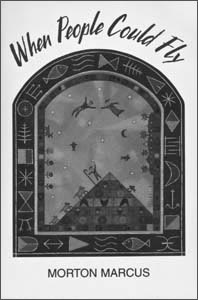Sifting for Real Gold
Morton Marcus' prose poems reveal a tender affection for our mortal follies
By Ann Elliott Sherman
AS ITS TITLE MIGHT suggest, Morton Marcus' collection of prose poems, When People Could Fly, has stronger links with the storytelling traditions of myth and folk tale than with French godfathers of the form like Baudelaire or Rimbaud.
Marcus admits as much in one piece, equating surrealists with alchemists who try to turn lead into gold. "They sit all night by the mountain of the psyche ... waiting ... for the moment a shower of yellow butterflies, as elusive as moonbeams, scatters from deep inside the mountain," while the author and a simpatico colleague diligently sift through gravel for the real gold.
That is not to say that Marcus breaks entirely with the sense of absurdity usually evident in the prose poem. But where one might ordinarily find an undercurrent of world-weary detachment, black humor or downright perversity in a prose poem's tone, Marcus reveals a tender affection for our mortal follies. His description of "The Storyteller" serves as a kind of self-portrait: "All his stories were impossible but never cruel."
Marcus' strategy is obliquely put forth in "The Man Who Committed Suicide," a piece that can be interpreted as a kind of allegorical manifesto. Horrified by his daily readings of news reporting nothing but violence and abuse, and left only with pen-scratchings on a notebook to communicate "his immense disgust at the barbarity of the human race," the man swallows a bottle of sleeping pills.
He wakes up the next morning to find the rest of the world in an endless sleep, and after a day and night of listening to nothing but wind wrapping itself around the motionless city, he realizes what he must do. Starting with the news seller across the street, the man awakens the sleepers with "a kiss that was gentle and firm at the same time."
Marcus succeeds best at breathing life back into sleeping giants of history, where what the reader knows or is told about the actual persons or events lends heft, and the sharper edge of reality hones his flights of fancy. "Guillotine" is an especially deft weaving of the fear, resignation and unexpectedly funny last thoughts of a French noble with his neck on the block.
In "A Game of Chess," the author crafts a lovely wheel-within-a-wheel spin on Hernando de Soto teaching imprisoned Inca chief Atahualpa to play chess--fact, memory, image and book-learned and family history gracefully unfurled to raise a resonant, unanswered question.
In the final passages of some of the poems, however, Marcus feels the need to school the reader in what it all means--or to tie things up with some kind of resolution, rather than let a fruitful ambiguity permit an independently reached thought or interpretation.
As a result, these prose poems often seem more like parables or cautionary tales. Where the tendency wasn't annoying, I found myself thinking, "Hmm, this would make a nice kids' picture book." But other works, such as the title piece, even when leavened by punning pseudohistorical names like Shu-tung Wu and spoofs of academic scholarship, deliver such a heavy dose of cultural re-education that they ultimately go down like castor oil.
In its finer moments, When People Could Fly escapes its tethers of reaction and good intentions, and Marcus' warm humanity produces its own tonic effect, "as if you had touched the secret place where hardness ends and vulnerability begins."
[ San Jose | Metroactive Central | Archives ]
![]()

When People Could Fly
By Morton Marcus
Hanging Loose Press; $13 paper
From the February 26-March 4, 1998 issue of Metro.
![[Metroactive Books]](/books/gifs/books468.gif)